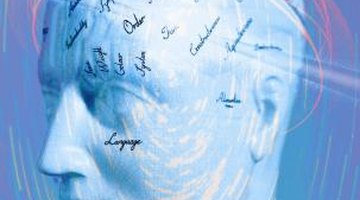Cognitive neuropsychologists study patterns of brain damage, such as perceptual and cognitive impairments, focusing on neuropsychological deficits. Investigating impaired cognition leads to understanding about normal cognitive processes. Many programs, like those listed by the American Psychological Association or “U.S. News and World Report,” often teach cognitive neuropsychology within experimental psychology or cognitive neuroscience degree programs. Primarily a doctoral-level degree, a few universities offer bachelor's or master's programs.
Northeastern Programs
Harvard University offers a Ph.D. in cognition, brain and behavior, studying sensation and perception, mental imagery, aging and moral decision-making in normal adults and children and those with brain damage, using methods like neuroimaging. The City University of New York offers a doctorate in behavioral and cognitive neuroscience, providing a foundation in molecular, cellular, systems behavioral and cognitive neuroscience, with concentrations in areas like neuroscience of brain disease and disorder.
Southern Schools
The University of Florida confers doctoral degrees in clinical psychology with concentrations in neuropsychology, emotion neuroscience or psychopathology, focusing on neurobehavioral research and assessment of higher cortical function and dysfunction in adults and children. The University of Georgia offers a Ph.D. through an interdisciplinary neuroscience program, emphasizing developing treatments for neurological and behavioral disorders such as Alzheimer’s, depression, schizophrenia and addiction.
Midwestern Universities
The University of Wisconsin at Milwaukee offers a Ph.D. in experimental psychology with a concentration in neuroscience, focusing on experimental design and neurophysiology, along with mechanisms of learning and memory, and brain damage recovery. Washington University in St. Louis offers a doctoral program interfacing psychology, neuroscience and genetics with concentrations in psychology and neuroscience or genetics, approaching psychology with biomedical perspectives for issues like schizophrenia, emotion regulation and social cognition.
Western Schools
The University of Utah provides a doctoral program in cognition and neural science, merging brain and cognitive science, studying visual perception, attention, memory and executive functioning, using methods like virtual environments. The University of California at Los Angeles offers a Ph.D. with a concentration in behavioral neuroscience, focusing on physiological psychology, like the effects of brain lesions on learning, and engaging in research alongside world-renown scientists at the Brain Research Institute.
Bachelor's and Master's Programs
The University of San Diego offers a bachelor's degree with a cognitive neuropsychological major, including courses such as memory and amnesia, concepts of intelligence and cognitive neuroscience of vision. Johns Hopkins University offers a bachelor's in cognitive science with a concentration in cognitive psychology and cognitive neuropsychology, offering courses in imaging the mind, and mental models and mental logic. Boston College offers a two-year research master's with a major in cognitive neuroscience, studying how brain injuries impair linguistic and cognitive ability, human visual neuroscience, emotional contents' influence on memory and cognitive-behavioral methods to control stress.
Related Articles
References
- City University of New York: The Graduate Center, Psychology, Behavioral and Cognitive Neuroscience.
- Temple University: College of Liberal Arts, Brain and Cognitive Sciences.
- University of Florida: College of Public Health and Health Professions, Department of Clinical and Health Psychology, Major Areas of Study.
- University of Georgia: Biomedical and Health Sciences Institute, Interdisciplinary Neuroscience Ph.D. Program at UGA.
- University of Wisconsin at Milwaukee: Psychology, Experimental Psychology Ph.D. Program.
Resources
- Washington University in St. Louis: Interface of Psychology, Neuroscience, and Genetics Training Program.
- University of Utah: Department of Psychology, Ph.D. in C.N.S.
- University of California at Los Angeles: Department of Psychology, Behavioral Neuroscience.
- University of California at San Diego: General Catalog 2013-14, Psychology, the Undergraduate Program, Major Programs.
Writer Bio
John Huddle is an Army veteran with enlisted service as general hospital staff and hospital chaplain's assistant. His career also included stints as a teacher, adjunct faculty, administrator and school psychologist. Twice, Dr. Huddle was a major party nominee for state office. He also served as a director on several nonprofit boards. Today he enjoys consulting and lobbying for underdog causes.











